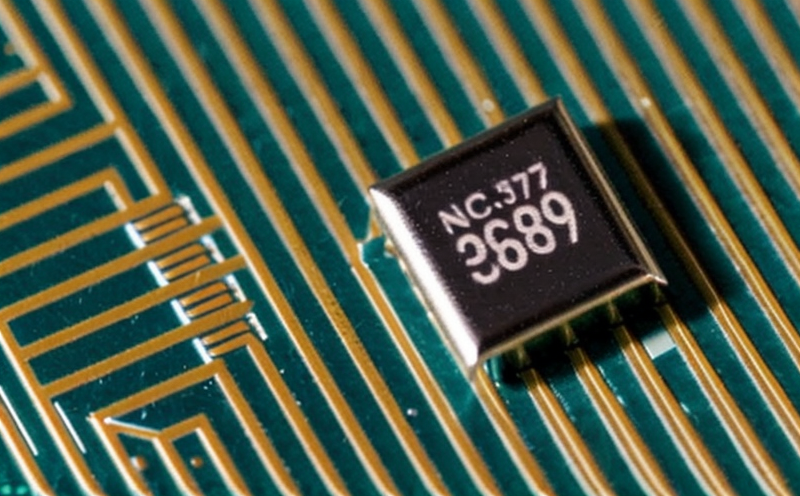ASTM F1294 Interconnect Reliability Testing
The ASTM F1294 standard is specifically designed to evaluate the reliability and lifetime of microchip interconnects, a critical component in semiconductor manufacturing. Interconnect reliability testing is essential for ensuring that the electrical connections between different parts of a chip function consistently over time under various environmental conditions. This test is pivotal for quality managers, compliance officers, R&D engineers, and procurement teams who are involved in the development and certification of microchips.
The ASTM F1294 test method involves subjecting the interconnects to multiple stress cycles that simulate real-world usage environments. These stress conditions include thermal cycling, mechanical vibration, and exposure to moisture or other corrosive agents. The goal is to determine how well the interconnects withstand these stresses without failing.
The testing process begins with careful preparation of the test specimens. Typically, these are fabricated using advanced metallization techniques that ensure accurate representation of actual chip interconnect structures. Once prepared, the samples undergo rigorous inspection and characterization before being subjected to the specified stress conditions as outlined in ASTM F1294.
The standard specifies detailed protocols for applying thermal cycling, mechanical vibration, and environmental exposure tests. Each cycle is designed to mimic specific real-world scenarios such as temperature extremes encountered during transportation or operation of electronic devices. For instance, a typical thermal cycling test might involve heating the interconnects to 125°C and then cooling them down to -40°C repeatedly over several hours.
During these tests, extensive monitoring is conducted using high-precision measurement equipment to track any changes in electrical resistance or mechanical integrity of the interconnects. This data provides insights into potential weak points within the design that could lead to premature failure. Additionally, advanced imaging techniques like scanning electron microscopy (SEM) can be employed to examine surface morphology and identify defects at a microscopic level.
The results from ASTM F1294 testing are critical for several reasons. They help ensure product quality by identifying vulnerabilities early in the development process allowing manufacturers time to address issues before mass production begins. Compliance with industry standards like this one also enhances brand reputation among customers seeking reliable products.
Moreover, successful completion of ASTM F1294 tests serves as a testament to the robustness and longevity of microchip interconnects which is particularly important for industries reliant on high performance computing systems such as automotive electronics or aerospace avionics. By adhering strictly to these guidelines, laboratories can provide clients with accurate assessments that contribute towards safer and more efficient technological advancements.
In conclusion, ASTM F1294 interconnect reliability testing plays an indispensable role in maintaining high standards within semiconductor manufacturing processes by providing detailed insights into the durability of crucial components. As technology continues to evolve, so too must our methods for verifying its integrity ensuring continued progress across all sectors dependent on advanced electronics.
Why It Matters
Reliability testing is paramount in semiconductor manufacturing because even minor failures can have significant consequences. For instance, a single defective interconnect within a complex microchip could result in system malfunctions leading to costly repairs or replacements. In sectors like automotive where reliability is non-negotiable due to safety concerns, such defects could lead to life-threatening situations.
From an economic perspective, ensuring reliable interconnects through thorough testing not only reduces warranty claims but also minimizes downtime associated with product recalls. This translates directly into lower operational costs and increased customer satisfaction as companies deliver products that meet or exceed expectations consistently.
The importance of ASTM F1294 cannot be overstated given its stringent requirements aimed at mimicking real-world usage scenarios more accurately than other testing methods available today. By following this standard, manufacturers can gain competitive advantages by demonstrating superior product quality to potential buyers. Additionally, adherence helps maintain compliance with regulatory requirements thereby protecting brands from legal issues.
Furthermore, successful completion of these tests builds trust among stakeholders including suppliers, partners, and end-users who rely on the performance and longevity of semiconductor products. This fosters long-term relationships beneficial for both industry players and consumers alike.
Customer Impact and Satisfaction
The impact of reliable microchips extends beyond mere functionality; it significantly enhances customer satisfaction by delivering dependable performance over extended periods. When interconnects perform flawlessly despite exposure to harsh conditions, customers experience fewer disruptions in their operations or daily activities.
For instance, in the healthcare sector where life-saving devices depend on robust electronics, ensuring that interconnect reliability meets ASTM F1294 standards translates into improved patient outcomes. Similarly, in consumer electronics like smartphones and tablets, consistent performance without unexpected failures leads to higher customer loyalty and repeat purchases.
From a broader societal standpoint, reliable microchips contribute positively towards sustainability goals by extending the lifespan of devices thereby reducing electronic waste generation. The durability demonstrated during ASTM F1294 testing supports efforts aimed at creating more sustainable technologies.
In summary, investing in comprehensive interconnect reliability testing using ASTM F1294 ensures that customers receive products they can trust, fostering long-term relationships and contributing to overall industry growth.
Competitive Advantage and Market Impact
In a highly competitive market characterized by rapid technological advancements, maintaining high standards of reliability is crucial for achieving and sustaining a competitive edge. Companies that prioritize ASTM F1294 testing demonstrate commitment to excellence which resonates strongly with discerning customers seeking premium quality products.
The ability to consistently produce reliable microchips not only enhances brand reputation but also opens doors to new market opportunities as businesses seek suppliers who can meet stringent quality benchmarks. This proactive approach attracts partnerships and collaborations that drive innovation forward, ultimately benefiting all parties involved in the supply chain.
Moreover, companies compliant with ASTM F1294 standards enjoy enhanced credibility among regulatory bodies and industry associations, further bolstering their standing within the marketplace. Such recognition fosters increased visibility and trust among stakeholders, positioning them as leaders in their respective fields.
In essence, prioritizing ASTM F1294 interconnect reliability testing equips companies with tools necessary to navigate competitive landscapes successfully while driving market impact positively across various sectors reliant on advanced electronics.





